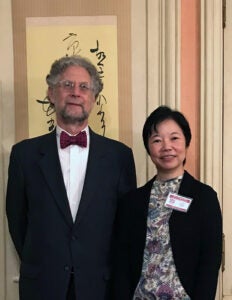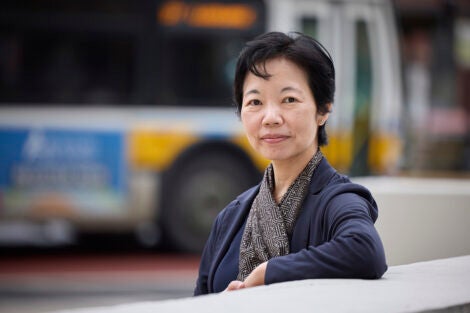February 29, 2024 — Aya Goto earned an MPH at Harvard T.H. Chan School of Public Health in 1998 and later became a fellow in the School’s Takemi Program in International Health. After pursuing a career as a public health physician and a professor at Fukushima Medical University in Japan, Goto returned to Harvard Chan School in January, as Taro Takemi Professor of the Practice of International Community Health and director of the Takemi Program. She recently spoke about her work promoting health literacy and what it means to follow a cherished mentor in her new role.
Q: Where did you grow up?
A: I grew up in Gunma Prefecture, a rural, remote area in Japan. My father is a practicing doctor, and my mother was a lab technician before she married. When I was ten, we moved to Nashville, Tennessee, for my father’s work and stayed there for about a year. Many of my friends were refugees from Vietnam and Cambodia. I think that was when I became very interested in what’s happening in the world.
Q: What’s a highlight from your MPH studies?
A: I learned the joy of doing research from Professor Michael Reich [Taro Takemi Professor of International Health Policy, emeritus]. I wrote a paper for his ethics class on the approval of oral contraceptive pills that he advised me to develop into a real academic paper. I sent him one or two paragraphs a week and he commented on them, patiently asking questions and getting me to think. It became my first published paper—a big achievement and a very good start to my academic career.
Q: How did the accident at the Fukushima nuclear plant in 2011 affect your career and your aspirations in public health?
A: That was a huge event in my life. I had worked as a public health doctor in Vietnam earlier in my career and had been at Fukushima Medical University since 2000. After the accident, I started working with local public health nurses to respond to concerns of parents worried about the health effects of radiation exposure. People wondered if it was safe to stay—just as I did, as the mother of a small child.
After studying the science and consulting with radiation specialists, I was convinced it was safe to stay. But it was very difficult to communicate this information to local parents in a way that was easy to understand.
It was around that time that Professor Reich came to Fukushima to give a talk on crisis response. He advised me to apply for the Takemi Fellowship so that I could learn things that would help me contribute more to the community.
Q: The Takemi program’s goals include improving health systems and fostering leadership skills. What impact did the fellowship have on your career?
A: Rima Rudd taught me about health literacy, and how to organize and run workshops on the topic for health professionals. I did my first workshop with public health nurses in Fukushima right after the end of my fellowship, and they loved it. Since then, I’ve done workshops throughout Japan and in other countries.
The workshops focus not just on technical knowledge and skills but on interactive communication with community residents. How do you understand people’s needs and find the appropriate way to respond to them?
My research has shown that these workshops improved public health nurses’ self-confidence, and nurses have told me that the training helped them during the COVID-19 pandemic. Some participants have now started running their own health literacy workshops.

Q: Now you’re back at the School again, taking over the role of your long-time mentor, Michael Reich. What does that mean to you?
A: This is a difficult question. I don’t think I will understand what it means until much later as I continue managing the Takemi Program. But for now, I’m very honored to take this position. I will try to figure out how to best use what I learned from Professor Reich, particularly around working with fellows. I will also work to maintain the strong and wonderful relationships that Michael built with the Japan Medical Association and the Takemi family.
Q: What are your upcoming plans for research and teaching?
A: I will be continuing my work on a major project funded by the Japan Society for the Promotion of Science and the Japan International Cooperation Agency to implement and evaluate a participatory school health project for children. It’s called the Creative Health Project, and it involves activities like drawing, cooking, and acting. It’s lots of fun. I’m implementing it in Japan, Cambodia, Indonesia, Rwanda, and Vietnam.
I will be working mostly in Boston during the year but will continue to be deeply engaged in public health practice and research in Japan. I look forward to welcoming Harvard students and researchers who visit Fukushima, and Japanese students and researchers coming to Boston. I’m also planning to lead a new Winter Session field course in Fukushima next January for Harvard graduate students.
Photos: Kent Dayton; courtesy of Michael Reich
